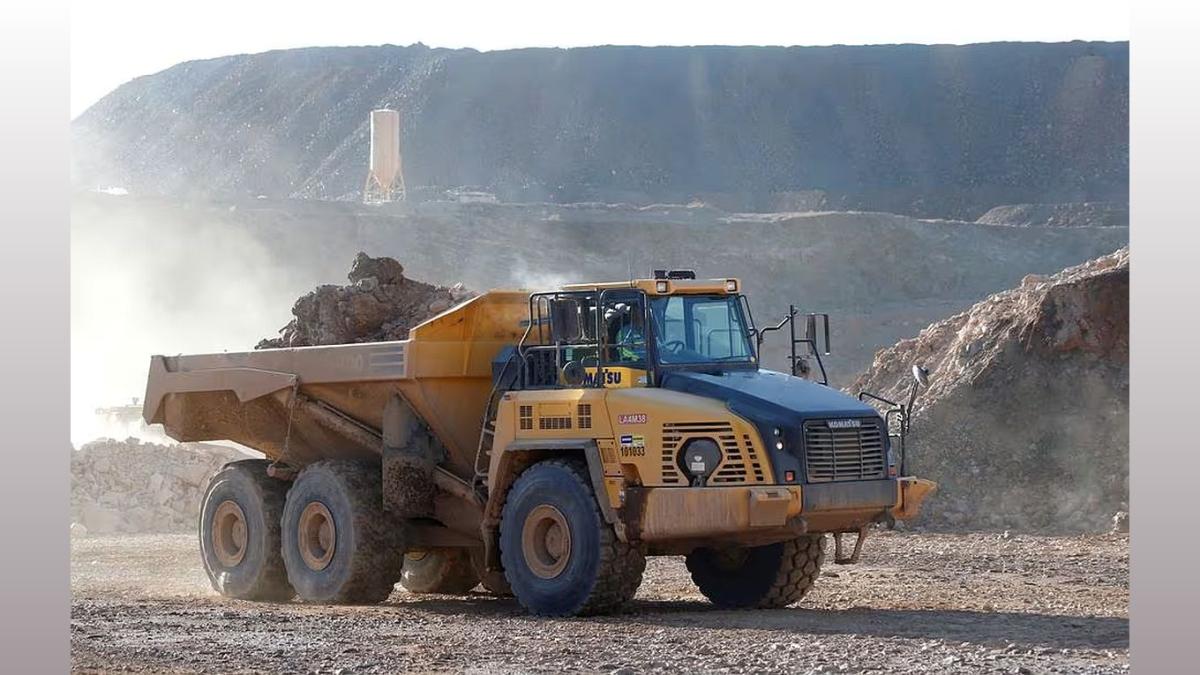Coal to Remain Key Energy Source for India for Next 2 Decades: Economic Survey
India's Economic Survey highlights coal's continued importance in energy for the next two decades, while emphasizing the need for cleaner technologies and mineral imports.

Photograph: Steve Marcus/Reuters
New Delhi, Jul 22 (PTI) Coal is expected to continue to be the backbone of the Indian energy system for the next two decades and the phase-down of the dry fuel will be heavily dependent on the import of critical minerals required for clean energy and battery storage, the Economic Survey on Monday said.
The carbon dioxide removal technologies and carbon capture utilisation and storage need to be explored to bring down the emissions from the use of coal, as per the Economic Survey 2023-24, which was tabled in Parliament.
"Coal phase-down will be heavily dependent on the import of critical minerals required for renewable energy and battery storage unless the country invests in the development of technologies based on domestically available mineral resources and those that enable the reuse, recovery, and recycling of critical minerals," it explained.
It further said the adoption of gasification technology in India can transform the coal sector and bring down the dependence on import of natural gas, methanol, and ammonia, and will help lower emissions.
Coal, which accounts for 70 per cent of the total electricity generation, is also a critical input in various industries, such as steel, sponge iron, cement, and paper.
"Adopting gasification technology in India can revolutionise the coal sector, reducing reliance on imports of natural gas, methanol, ammonia, and other essential products while reducing emissions," the Economic Survey 2023-24 said.
The Centre has launched several clean coal initiatives, including the coal gasification mission. The country is aiming to gasify 100 million tonnes of coal by 2030 through surface coal, lignite gasification projects.
Initiatives such as extracting coal bed methane gases, exploring coal to hydrogen, carbon capture and storage, and coal beneficiation through washeries can reduce emissions and enhance environmental sustainability.
"Encouragement to adopt super-critical and ultra-super-critical technologies for coal power plants has also led to lower emissions and higher efficiency," it said.
Coal accounts for more than 55 per cent of India's primary commercial energy. Coal-fired power generation accounts for about 70 per cent of the total power generation.
The carbon dioxide removal technologies and carbon capture utilisation and storage need to be explored to bring down the emissions from the use of coal, as per the Economic Survey 2023-24, which was tabled in Parliament.
"Coal phase-down will be heavily dependent on the import of critical minerals required for renewable energy and battery storage unless the country invests in the development of technologies based on domestically available mineral resources and those that enable the reuse, recovery, and recycling of critical minerals," it explained.
It further said the adoption of gasification technology in India can transform the coal sector and bring down the dependence on import of natural gas, methanol, and ammonia, and will help lower emissions.
Coal, which accounts for 70 per cent of the total electricity generation, is also a critical input in various industries, such as steel, sponge iron, cement, and paper.
"Adopting gasification technology in India can revolutionise the coal sector, reducing reliance on imports of natural gas, methanol, ammonia, and other essential products while reducing emissions," the Economic Survey 2023-24 said.
The Centre has launched several clean coal initiatives, including the coal gasification mission. The country is aiming to gasify 100 million tonnes of coal by 2030 through surface coal, lignite gasification projects.
Initiatives such as extracting coal bed methane gases, exploring coal to hydrogen, carbon capture and storage, and coal beneficiation through washeries can reduce emissions and enhance environmental sustainability.
"Encouragement to adopt super-critical and ultra-super-critical technologies for coal power plants has also led to lower emissions and higher efficiency," it said.
Coal accounts for more than 55 per cent of India's primary commercial energy. Coal-fired power generation accounts for about 70 per cent of the total power generation.
You May Like To Read
TODAY'S MOST TRADED COMPANIES
- Company Name
- Price
- Volume
- Vodafone-Idea-L
- 11.36 ( -2.49)
- 94664837
- AvanceTechnologies
- 1.16 (+ 4.50)
- 34522155
- Sunshine-Capital
- 0.26 ( -3.70)
- 29015901
- Alstone-Textiles
- 0.27 ( -3.57)
- 28695959
- Mehai-Technology
- 1.65 ( -4.62)
- 28262795






